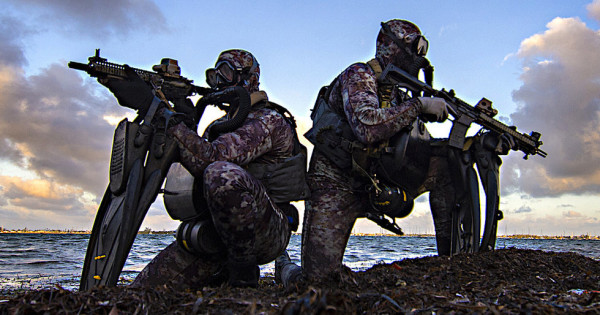

[shortcode-Op-Ed-disclosure]
The commander of the US Navy Special Operations Command, Rear Admiral Collin Green, issued a letter to his subordinates last week telling them that there is a problem with discipline within the SEALs that must be addressed immediately. It’s been obvious for awhile that there is something dysfunctional within special operations generally, and naval special warfare in particular.
Special operations forces are famously afforded latitude in certain regulations not given to conventional forces. Those are supposed to be for legitimate operational reasons, such as modified grooming and uniform standards for working with indigenous forces. They aren’t supposed to be a reward for being “special.”
The SEALs, while undoubtedly having done more than their share in the conflicts of the past two decades, are still subject to the Uniform Code of Military Justice, as are all those wearing the nation’s uniform.
Cue the reaction from the usual suspects, such as former SEAL and disgraced political operativeCarl Higbie.
In an open letter published on August 1, Higbie wrote, “…cut us some slack if we want to have a few beers in Iraq between gunfights,” referring to the recent case where a SEAL platoon was sent home after being caught drinking. He correctly pointed out that drinking while deployed isn’t exactly unprecedented behavior among service members, making it sound as if they were expelled by some prudish teetotaler for sneaking a fifth of Jack into the country.
Actually, there was an allegation of sexual assault against a member of the platoon and the rest of the unit decided to not cooperate with the investigation. With that bit of context, perhaps senior leaders were right to give the SEALs a little extra scrutiny. Most leaders might overlook someone sipping a drink or smoking a cigar behind the CONEX.
They can’t ignore someone allegedly being assaulted and that being covered up.
But in Higbie’s words, “….cut us — and quite frankly any other soldier who is willing to die for his or her country — some slack.”
Is that “cutting slack” inclusive of cocaine use, sexual assault, and murder? While the SEALs seem to have conduct issues disproportionate to the size of their organization, this idea that service — especially combat service — somehow earns one a free pass, seems to have some currency today.
War is indisputably horrible, and sometimes it calls for brutality in order to accomplish a mission.
The types and limits of that brutality are described in detail in any number of laws and rules, from the UCMJ to the Law of Armed Conflict. Being in the military doesn’t exempt you from rules — it actually affirmatively subjects you to them. It’s adherence and enforcement of such rules that distinguishes members of legitimate armed forces from mercenaries, criminals, and terrorists.
The most important rules undoubtedly involve conduct on the battlefield itself, but good conduct is not something one can just turn on and off like a light switch. Militaries with poor conduct and discipline in garrison will have the same in battle.
As the saying goes, “take care of the little things and the big things take care of themselves.”
While it’s easy to glamorize the SEALs for their rightfully earned status as an elite force, they aren’t exempt from the discipline and adherence to orders and regulations that holds the U.S. military together.
Service members don’t get to choose which orders are necessary and which are for POGs. There’s a reason that one can usually tell a good unit from a bad one within five minutes of stepping through the quarterdeck. Building a unit without the foundations of good discipline is like building a house on sand.
This is not to say that good leadership is just an exercise in martinet-like enforcement of frivolous and inconsequential rules. Discipline untempered by judgment and mercy can easily descend into petty cruelty.
But those excusing crimes on account of how elite or brave a service member might be are missing a critical piece of what defines selfless service. Service doesn’t earn one the slack of getting a lower standard. It earns the honor of maintaining higher standards.
[shortcode-Carl-Forsling-bio]